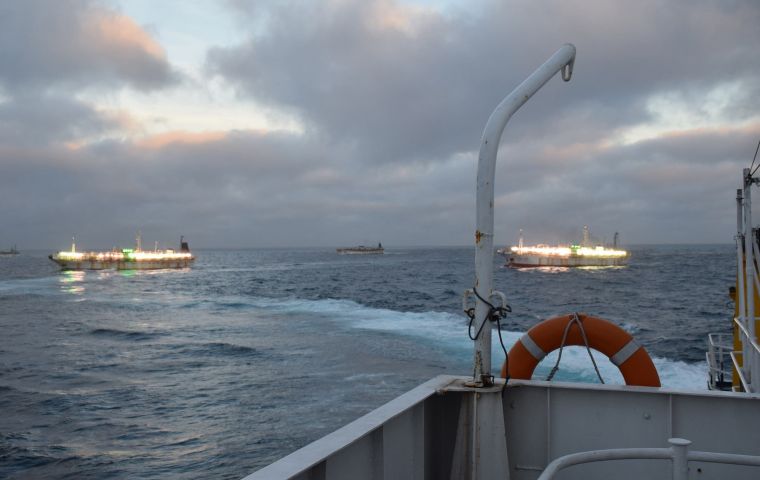MercoPress. South Atlantic News Agency
Argentine fishing industry against granting facilities to the Chinese fleet in the South Atlantic
 China is a main actor involved in illegal, unreported and unregulated activities, points out the industry in the letter to the president.
China is a main actor involved in illegal, unreported and unregulated activities, points out the industry in the letter to the president. The different chambers of the Argentine fisheries industry have joined efforts to expose alleged plans to grant the Chinese fishing fleet in the South Atlantic, “strategic corridors” in Patagonia ports for support and maintenance of their vessels, reports pescare.com.ar.
The fishing industry claims the Chinese fleet operate mainly along mile 201 of Argentina's Exclusive Economic Zone with no respect for conservation, particularly referred to straddling species. Apparently the Argentine government is considering granting Chinese vessels strategic access to Patagonia ports for services and supplies.
With this in mind the industry sent letters of warning to president Mauricio Macri, to Production and Labor minister Dante Sica and to the Argentine foreign ministry.
“It's not possible to grant port and operational facilities to those who repeatedly have proven that they do not respect the rights and interests of Argentina, including illegal fishing
operations in our EEZ, evading inspections and ultimately have to be pursued....” points out the industry.
Granting facilities to the Chinese fleet, estimated in some 350/450 vessels operating along mile 201, would represent an explicit acknowledgement and consent to that presence in the zone.
“China is a well known protagonist of this practice and main actor involved in illegal, unreported and unregulated activities” points out the industry in the letter to the president.
The presence of some 350/450 foreign fishing vessels along Mile 201 is highly negative for conservation and straddling and highly migratory species such as squid.
They operate from November onwards with no respect for season timetables, not even when the squid fishery is closed. Besides the fleet operates with strong subsidies from the Beijing government, and compete openly and advantageously in different markets, with produce from Argentina
Argentine ports are already saturated in normal working conditions, and allowing 100, 200, 300 extra vessels would simply aggravate the situation. Other logistics considerations include the availability of containers and frequency of container ships.
Finally granting port facilities to the Chinese fleet would lower their production costs, which already work with a handicap in labor and fiscal issues.
Therefore the Argentine fisheries chambers request that the government denies the possibility of creating strategic corridors for the logistic support of Chinese vessels and dismisses possible alternatives.




Top Comments
Disclaimer & comment rulesCommenting for this story is now closed.
If you have a Facebook account, become a fan and comment on our Facebook Page!